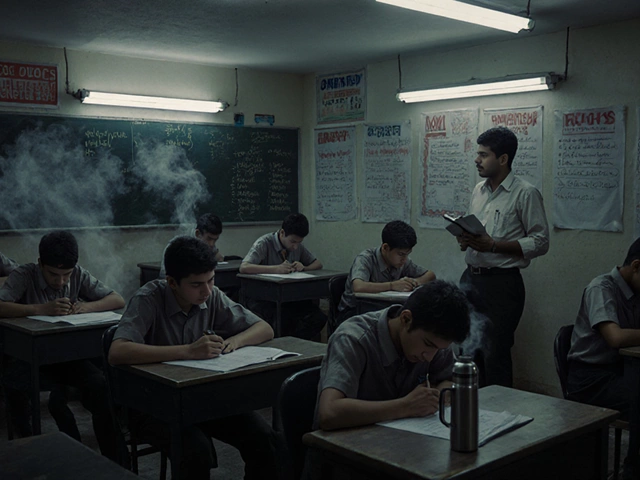Exams—they're a global rite of passage, aren't they? But, not all exams are created equal. Some push the limits of conventional testing to a whole new level and are infamous worldwide for their intensity and sheer difficulty. Ever wonder what these exams are like and what makes them so insanely tough?
Let's start with China's Gaokao, which isn't just about testing knowledge but also resilience and endurance. It's a make-or-break deal for Chinese students, often deciding their future paths. This intense pressure cooker involves long hours of study and tests that cover a wide array of subjects.
- Understanding Toughness in Exams
- The Infamous Gaokao
- The Grueling UPSC Civil Services Exam
- The Rigorous CFA Examination
Understanding Toughness in Exams
What makes an exam really tough? It's not just about the difficulty of questions. It's about the pressure, the competition, and sometimes, the stakes attached to the results. Some competitive exams test not only what you know but how you perform under stress, and how resilient you are when you're running on empty.
One key factor is the breadth of content. Exams like the Gaokao and UPSC throw an enormous range of topics your way. There's a lot you need to study, and knowing just a little about each subject won't cut it. You've got to dive deep.
Another factor is the level of competition. The more people vying for limited spots or prestigious titles, the fiercer the competition. This is especially true for exams like those in India, where millions compete for government positions or university seats every year. The pressure to stand out in such a massive crowd is intense.
Endurance Testing
A tough exam also tests your stamina. Imagine sitting for hours, trying to stay sharp and focused, while your brain's screaming for a break. That's what global exams like Gaokao do – they test how long you can sustain peak performance.
Let's not forget that some exams demand skills beyond traditional academics. The CFA examination in finance, for example, tests your decision-making abilities with real-world financial problems. This means that acing the test requires practical skills and not just rote memorization.
The Stats Tell the Story
| Exam | Approximate Candidates | Success Rate |
|---|---|---|
| Gaokao | 10 million | 20% |
| UPSC | 1 million | 0.1% |
| CFA Level 1 | 200,000 | 42% |
These numbers underscore the challenge. With acceptance rates so low, it's clear these exams require serious dedication, thorough preparation, and a bit of luck to emerge victorious.
The Infamous Gaokao
When it comes to sheer intensity, China's Gaokao is often considered the gold standard of tough exams. Imagine an exam that literally decides the trajectory of your life. This isn't an exaggeration for many Chinese students. The Gaokao, a college entrance exam, is infamous for its role in determining which university, and thereby career, they can pursue.
Held annually, the Gaokao is a culmination of years of study, taken by millions of students across China. How many thousands of hours do you think go into preparing for a test like this? A lot! Students often start prepping years in advance, and the pressure is immense because the stakes are incredibly high.
What's on the Exam?
The Gaokao covers a broad spectrum of subjects including mathematics, Chinese literature, and English. Depending on the province, it might also test additional subjects like physics or geography. The curriculum is exhaustive, making this exam a real marathon.
It’s estimated that over 10 million students take this exam each year. Most students experience 12+ hour study days leading up to the exam, a testament to the intense competition. This makes the Gaokao an exam that tests not just knowledge but real stamina.
"The Gaokao is much more than an exam; it is a rite of passage and a monumental challenge for all Chinese students." – Dr. Li Xue, Education Analyst.
The Impact of the Gaokao
The Gaokao's impact extends beyond just academics. It influences social mobility significantly in China. A high score can lead to enrollment in prestigious universities, which often translates into better job prospects. No wonder students and families alike feel the pressure!
For those brave enough to tackle the Gaokao, understanding the exam's structure and expectations is crucial. Many students rely on mock exams and previous papers to prepare themselves adequately for this tough challenge.

The Grueling UPSC Civil Services Exam
If you thought you'd seen the toughest competitive exams, the UPSC Civil Services Exam in India might just change your mind. This exam is the gateway to the country's most prestigious government positions, including the Indian Administrative Service (IAS), Indian Police Service (IPS), and many others.
Attempted by over a million candidates every year, it's the selection ratio that alone speaks volumes about its toughness—only about 0.1% get through! Practically a triathlon for your brain, it tests not just bookish knowledge but also analytical skills and decision-making prowess.
Stages of the UPSC Exam
The exam is split into three stages:
- Preliminary Examination: This first hurdle involves two papers—General Studies and the Civil Services Aptitude Test (CSAT). It's a mix of multiple-choice questions, and only those who clear this make it to the mains.
- Main Examination: Consists of nine papers, including some essay-type ones. This is where you need to show your depth of understanding across various subjects.
- Personal Interview: The final stage tests your personality, presence of mind, and overall suitability for the civil services role. Here, your social etiquette and ethical judgment are under the microscope.
Tackling the UPSC Beast
If you’re brave enough to conquer this exam, start by immersing yourself in a slew of books on diverse subjects from history to economics. Preparation often spans a year or more, with many candidates choosing to enroll in coaching classes for that extra edge.
- Create a study schedule that covers all subjects and stick to it rigorously.
- Keep abreast of current affairs, reading newspapers daily is a must-do!
- Mock tests are your best friends; they help you manage time and improve accuracy.
What sets apart those who succeed isn't just knowledge; it's resilience and strategy. The UPSC demands unwavering dedication and a systematic approach, but cracking it is like unlocking a world of immense opportunities in the Indian civil services.
The Rigorous CFA Examination
Ever thought about conquering the world of finance? The Chartered Financial Analyst (CFA) exam might be your ticket in, but be ready for a wild ride. Known for its brutal difficulty, this test is the gold standard for investment professionals worldwide.
What Makes It So Challenging?
The CFA exam is split into three levels, and trust me, each is its own beast. On average, candidates spend over 300 hours preparing for each level. Yeah, you heard me right—300 hours per level! Mastering topics like ethical practices, risk management, and financial reporting is no small feat.
Topics and Preparation
Candidates cover a broad range of subjects from quantitative methods to portfolio management. Want some advice? Start by sticking to a strict study schedule. Due to its depth, following a disciplined approach with organized study materials and consistent breaks is crucial.
Success Rates and Career Impact
How likely are you to pass? Well, the pass rates can be daunting—around 45% and 47% for the first two levels in recent years. But hey, those who pass find a significant boost in their careers. Think roles like a financial analyst or portfolio manager—positions any finance-savvy professional dreams of.
Exam Structure
Each level gets progressively tougher with a blend of multiple-choice questions, essay-type scenarios, and case studies. On exam day, it's less about breezing through questions and more about applying analytical skills to solve complex problems.
- Level I: Focuses on a basic understanding of the ten topic areas and simple analysis using investment tools.
- Level II: Calls for more detail and analysis, emphasizing asset valuation.
- Level III: Concentrates on synthesis and evaluation, combining elements of the previous levels to solve complex problems.
Final Thoughts
The CFA examination is not just an exam but a journey. It's grueling, sure. But for those who are committed, the rewarding opportunities it unlocks are worth the sweat and tears. Ready to open that finance door, or simply curious to learn more? Knowing what you're getting into is already half the battle won!





